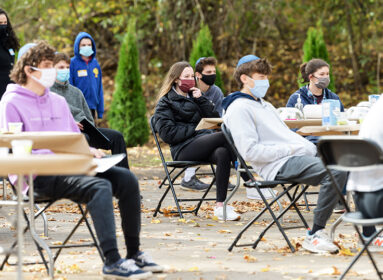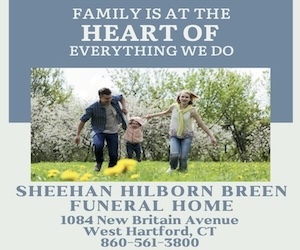
Wash your hands. Don’t touch your face. Practice social distancing. Stay home. At this point, we all know how to protect ourselves from the COVID-19. But what about our inner selves? We asked our rabbis for spiritual guidance to help Connecticut’s Jewish communities cope with the coronavirus crisis. Here’s what they said.
NOTE: We invite our readers to share their own stories about how they’re adapting to the current public health threat. To join in the conversation, email Ledger editor Judie Jacobson at judiej@jewishledger.com.
Rabbi Randall J. Konigsburg
Beth Sholom B’nai Israel
Manchester
A lesson from the Midrash says, to control pride, we should carry in our pockets two pieces of paper. One should have on it, “We are but dust and ashes.” and the other “for my sake was the world created.”
At this time, we are being asked, in the face of this pandemic, to be afraid. We are asked to self-quarantine, to keep a six-foot social distance between our friends and neighbors, to close our businesses, to not visit bars or restaurants and to stay away from groups larger than 500 250 100 50 10. We need to do this for our own health and for the health of our elderly and/or frail friends who have the most to lose from contact with the COVID-19 virus.
We must also not live in fear. We must turn our fear into concern for our self and for others; we can’t hoard supplies or turn our backs on the needs of others. We should not be so afraid that we are unable to do our work online or in a virtual space.
My good friend Rabbi Ora Horn Prouser teaches that in our time we need different pieces of paper in our pockets. One should have on it the words of Rabbi Nachman of Bratzlav, “The whole world is a narrow bridge, and the important thing is not to be afraid,” the other paper should have the words of the prophet Amos, “When a lion roars, who is not afraid?” The issue to me is that we should NOT be afraid, but we SHOULD be concerned.
God is always with us; we need not live in fear.
Rabbi Yitzchok Adler
Beth David Synagogue
West Hartford
The irony of the moment, or of the moments yet ahead of us and yet to be counted, is that community is now among the words most important to social dialogue. Closed schools and shuls and athletic clubs, limited shopping hours, and distancing all challenge the old-world conventional thinking. It is old-world, not because the coronavirus will be with us forever; but because the pandemic has forced all of us onto a learning curve. That learning curve, if experienced in positive ways, bears the potential of expanding how members of a community can care for each other, demonstrate care about each other, and interact. Early last week, in a Facebook response to one of Beth David’s congregational messages, a member wrote “physical distancing, social closeness”.
My wife and I are using the current schedule of closed schools and no services at shul to try to walk together more, and we are meeting and talking with more neighbors than I can remember. They are not new neighbors, they are simply people that I simply did not know very well. Because of the virus, I now know more people. My inbox has been a steady flurry of e-mails from healthy people offering to assist vulnerable and elderly people that they have never met. The scope of chesed and kindness is reaching new horizons.
When synagogues re-open, there will be many special reasons to offer prayers of thanks, as there will be also delayed recitations of Kaddish waiting to be recited. In either case, the liturgies will draw our attention to God and Heaven’s providence over all creation. When the pandemic abates and government relaxes its restrictions, it will be important that we not forget the social closeness that was a by-product of the coronavirus. If it is true that behind every dark cloud there lurks a silver lining, may knowing each other a little better, caring about each other a little more, and doing more for the strangers among us allow one of the aftermaths of this pandemic to be a beacon of light on brighter tomorrows.
Rabbi Jeffrey Glickman
Temple Beth Hillel
South Windsor
There are many components of a person. Health means vibrant body and soul. Our prayers of healing speak of refuah et ha-guf, v’refuah et ha-nefesh – healing of body, healing of soul.
Right now we are on the verge of a potential epidemic of bodily disease. Right now we are in the midst of an actual epidemic of disease of the soul.
Unprecedented waves of fear are amplified by unprecedented isolation.
The more we focus on self preservation, the more fearful we become.
For pikuach nefesh – preservation of the soul – we need to find responsible ways to welcome strangers, free the captives and break cruel chains. Our community needs it, but so do we, to preserve our individual souls.
Senior centers are closed. People who crave the community there are bereft. Make it known that you would like to be paired with a senior for a daily call.
Sponsor meals at quarantine facilities.
Let me know what you are doing so I can share your ideas with others.
For all who are in need, we pray for refuah et ha-guf and refuah et ha-nefesh.
Rabbi Mitchell M. Hurvitz
Temple Sholom
Greenwich
Jewish history has taught us over and over again that one must remain calm amidst the storm to be as useful in navigating the tumult as humanly possible.
Fear, adequately managed, can lead to very positive results. We can be motivated to make changes in our course of direction that we might otherwise not feel compelled to do.
Reading or watching the news can make us understandably anxious. Commonly, too much misinformation is distributed. And, almost always, negative news is more emphasized than positive news.
Within our Hebrew Bible, God tells us over and over again: “Don’t Fear!” God is not telling us that we cannot fear, but instead, we cannot give in to our fears. For, if we were to give in to fear, then we will fail to see the bigger picture and lose the opportunities to be as effective as we are when confronting any particular crisis.
Our Jewish history has brought many, many challenges.
The best advice provided by rabbinic tradition is that “the whole world is a narrow bridge, and the most important thing is not to be afraid.”
Follow all medical guidance, assure as safe an environment as possible, but do not act out of fear.
Instead, cling on to our sacred values and care deeply for others who need support.
A good Jew never turns their back on anyone else, but always lives by the Golden Rule.
Rabbi Debra Cantor
B’nai Tikvoh-Sholom/Neshama Center for Lifelong Learning
Bloomfield
First, a confession. I am not good at this. This physical distancing (I refuse to call it social distancing, when what we need now is social closeness) feels unnatural. I miss shul. I miss schmoozing at kiddush. I miss hugging people and shaking their hands. Like all of you, I’m worried about people I love. And like many of you, I’ve been frantically trying to get up to speed on going virtual. Teaching via Zoom and praying via Facebook Live.
But maybe what I really need to do – maybe what all of us need to do at this particular moment – is to breathe. In Hebrew the word lin-shome – to breathe – is related to the word neshama, which means both breath and soul. On Shabbat morning, we chant a beautiful prayer which begins with the words Nishmat Kol Chai – The Breath/Soul of Every Living praises Your Name, Adonai…who is full of mercy in times of distress.
So what if, as one poet has recently suggested, we looked upon our current confinement not as a punishment but “as the Jews consider the Sabbath – the most sacred of times?” What if we reframed this whole experience as a kind of extended Shabbat, avoiding travel, not conducting business as usual or trying to change the world? After all, it’s not as if we have much control over what’s happening anyway. All we can do is stay home.
In this respite from normal life, we might find solace in quieter pursuits: in singing, in meditating and praying, in taking walks outdoors. We can take the opportunity to have longer conversations on the phone, to do deep listening. We can write letters and send cards. We can check in on others. We will have time for all of that.
The Jewish people has weathered many plagues and disasters in our long history. God willing, we will soon gather again in our synagogues and embrace once more. Until then, let us act with tremendous compassion and love toward one another. At this moment, not only Jews, but all humanity is united in the desire for healing. May this come speedily.








 Southern New England Jewish Ledger
Southern New England Jewish Ledger









